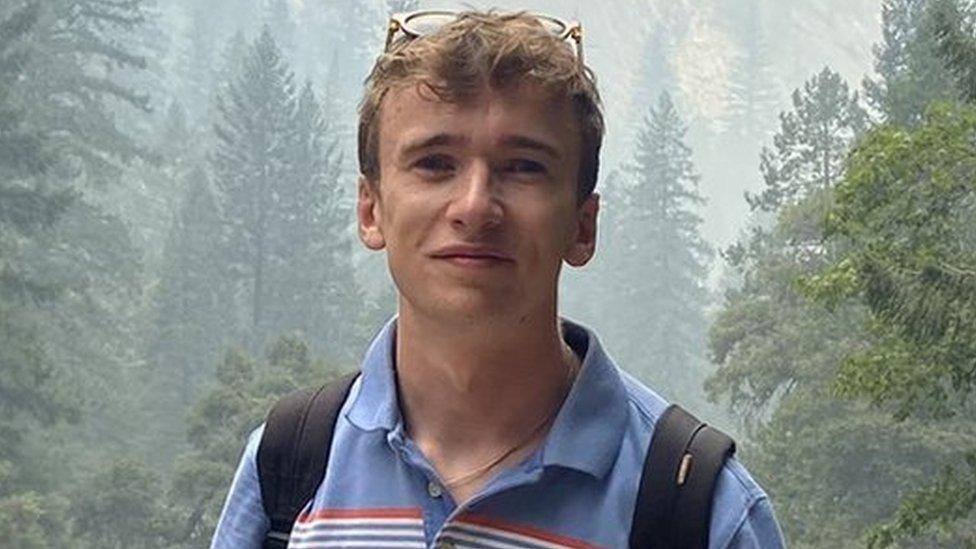Students to graduate without knowing final results
- Published
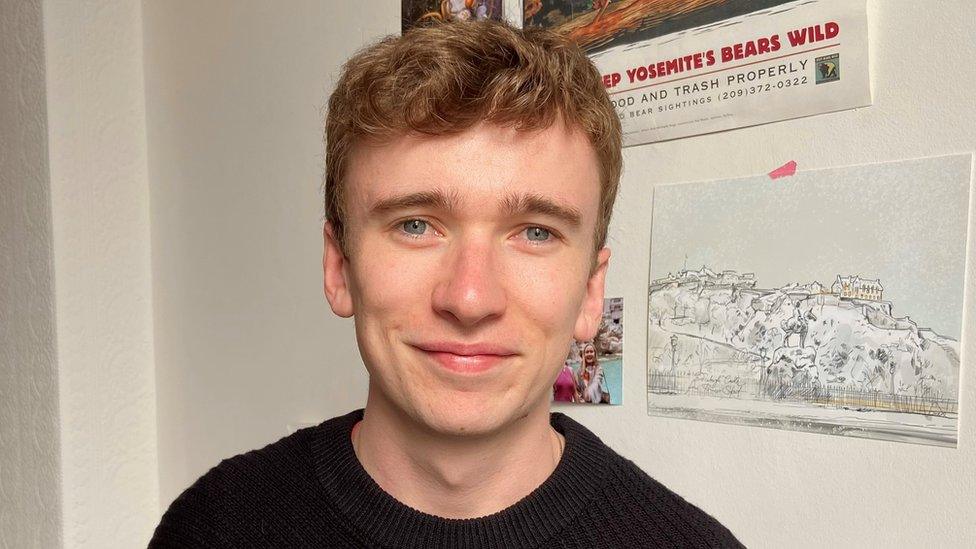
Ollie Lewis says students' confidence will be impacted by the degrees delay when it comes to applying for jobs
Students say they will be given an "empty piece of paper" when they graduate after the University of Edinburgh delayed the results of some degrees.
The delay, announced just weeks before graduation ceremonies are due to be held, is in response to a UK-wide marking boycott.
It means some students will graduate without knowing their final results.
They fear the move will put their job prospects at risk.
They also accused the university of refusing to negotiate on staff pay.
The university, which announced the delay in an email on Monday, said its priority was to mark exams in a "timely manner".
The marking boycott is part of industrial action being taken by members of the University and College Union (UCU) at 145 UK institutions in a dispute over pay and working conditions.
Final year students at Edinburgh have told the BBC they strongly support the staff, but condemned the university's's handling of the boycott.
Ollie Lewis, a politics student and freelance journalist, told the BBC he found the news about degree delays "incredibly disappointing".
"It's just so shocking after four years of work," he said. "A graduation is supposed to be a celebration of what I've achieved - and I don't know what I've achieved.
"I'll be walking across the graduation stage with an empty piece of paper."
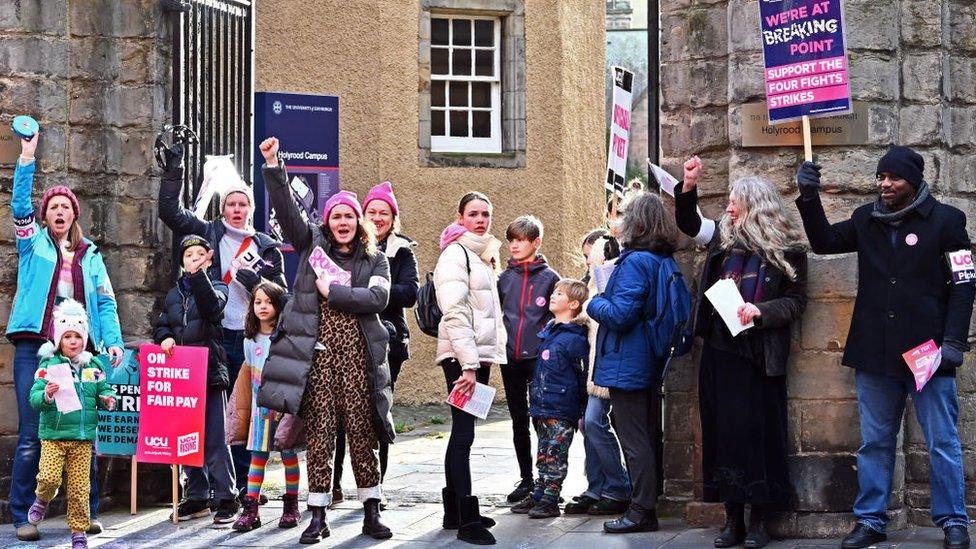
Staff at the University of Edinburgh are taking part in a UK-wide marking boycott over pay and conditions
The 22-year-old from Cambridge previously interviewed students and staff on the marking boycott for student paper the Edinburgh Tab, external.
He said his teachers were uncertain when they would be expected to mark outstanding work at a time when students were updating CVs and applying for jobs.
He accused the university of failing to negotiate with staff and said he did not believe the dispute would be resolved soon.
"Employers are being quite reasonable and know about the chaos going on," said Ollie. "But a lot of job adverts still expect a 2:1 result or at the bare minimum expect a university degree.
"This will have an impact on people's confidence applying for jobs."
Universities are taking independent decisions about how to minimise the impact of the marking boycott at each institution, so the effect on students will vary.
On Monday, the University of Edinburgh emailed students in certain schools to say a decision on the outcome of their degree had been delayed.
Some final year students at Edinburgh had already received their marks while others had been given a provisional award - the latter will receive their degree classification at a later date.
'I might have to delay a work visa'

Hannah McCormick speaks fluent Japanese and also reads in French and German
Hannah McCormick is among the languages students at Edinburgh who have also been told their degree decisions have been deferred.
Expecting to graduate on 12 July, the 23-year-old planned to move to Japan and has secured a job in a kindergarten.
Although she does not require a specialist skills work visa, her employer - who is handling her visa application - has asked her to provide evidence of a degree pass.
With her job due to start in August, Hannah has no idea if she will receive any evidence of her degree in time.
"We hope they might give us a pass or a fail but they haven't done that at all," she said. "I'm not sure if they'll issue us with a letter of completion, none of us know if that'll be sufficient.
"I would have to send it to my boss and labour manager who have to contact the immigration office and god knows how long that would take.
"It feels like they have made this decision as a sort of easy mitigation, but haven't researched whether it will be enough for us."
A University of Edinburgh spokesperson said students can request a letter of completion of studies, "which can be provided to employers or other institutions to clarify what marks they have received so far and the courses for which marks are still pending".
They added: "We are acutely aware that delays associated with the boycott are a major source of anxiety for our students, and we are deeply sorry about the continued uncertainty they face over their futures.
"We are working closely with many employers and through national groups, such as the Institute for Student Employers, as well as with other universities in the UK where students maybe seeking further study."
'I've missed out on the student experience'
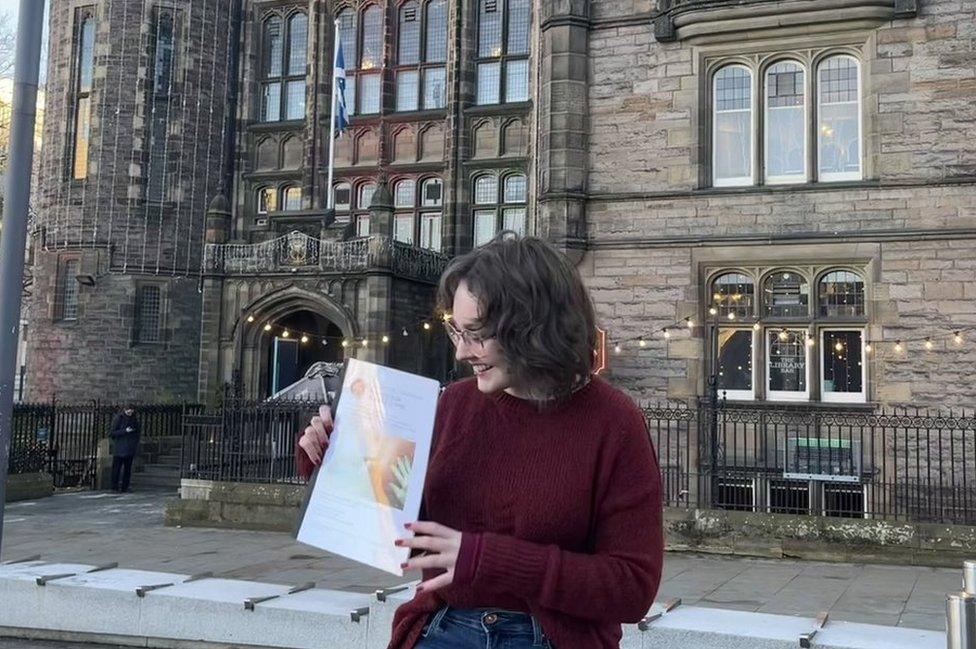
Hope Conway-Gebbie pictured with her dissertation in December
Hope Conway-Gebbie, from South Lanarkshire, was delighted when she completed her dissertation in December last year.
But the 22-year-old says the overwhelming feeling at the end of her four years is one of sadness.
"It's not something I've been able to make most of," she said. "It's been significantly impeded by the circumstances be it strikes or Covid-19.
"I'm going to celebrate the achievement of finishing uni, but I do think it's slightly cheapened by the fact I won't have a degree.
"I feel like I've missed out on having a proper student experience."
The politics and sociology student said she has been angered by the university for some time, particularly after hearing reports that the university's vice chancellor had received a pay increase of £43,000., external
"The university is completely shambolic but I have to say this is an extra layer," she said. "Last week they said would give us a provisional grade until our final grade came in but they've gone back on that at the very last moment.
"There's poor communication, poor leadership - and for me it has become so normalised. It's intense frustration."
The Scottish government said students were being adversely affected by the marking boycott and urged all involved to resolve it quickly.
A spokesperson said: "While the Scottish government is not directly involved in the UK wide higher education pay negotiations, we would urge unions and employers to negotiate in the spirit of collaboration and co-operation to minimise disruption to learners.
"We expect management and unions to make every effort to reach a settlement that is fair and affordable."
- Published20 October 2023
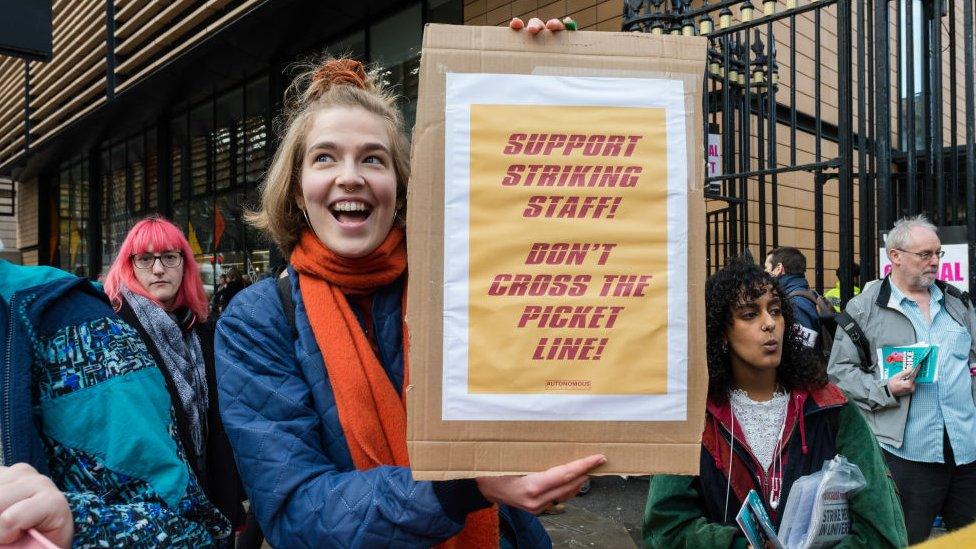
- Published16 June 2023

- Published12 May 2023
